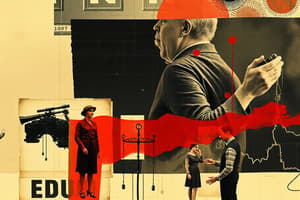Podcast
Questions and Answers
The term deviance can be defined as:
The term deviance can be defined as:
- Social reward for the violation of norms.
- The regulation and enforcement of norms.
- The act of notifying authorities when criminal acts are occurring.
- A violation of established contextual, cultural, or social norms, whether folkways, mores, or codified law. (correct)
Sociologist Edwin Sutherland is best known for Strain theory.
Sociologist Edwin Sutherland is best known for Strain theory.
False (B)
Which of the following is an example of a negative informal sanction?
Which of the following is an example of a negative informal sanction?
- Mario being sent to jail after robbing a CVS.
- Meredith receiving compliments on her hair after visiting the salon.
- Beatrix being booed off stage after telling an offensive joke during her comedy routine. (correct)
- Eleanor being given a 'Teacher of the Year' award for her work as a high school English teacher.
Which theorist studied the power elite, and the influence they had over society?
Which theorist studied the power elite, and the influence they had over society?
The term secondary deviance can be defined as:
The term secondary deviance can be defined as:
The term crime can be defined as:
The term crime can be defined as:
What is the difference between a violent crime and a hate crime?
What is the difference between a violent crime and a hate crime?
Sociologist Travis Hirschi is best known for Control theory.
Sociologist Travis Hirschi is best known for Control theory.
In first grade, Scott is unfairly singled out by his teacher for bad behavior...Which school of thought best fits Scott's experience?
In first grade, Scott is unfairly singled out by his teacher for bad behavior...Which school of thought best fits Scott's experience?
Bernie Madoff engaged in which form of crime?
Bernie Madoff engaged in which form of crime?
Sociologists Clifford Shaw and Henry McKay are best known for Cultural deviance theory.
Sociologists Clifford Shaw and Henry McKay are best known for Cultural deviance theory.
An average of _____ people in the United States fall victim to hate crimes each year?
An average of _____ people in the United States fall victim to hate crimes each year?
Which theory best describes Ally's experience?
Which theory best describes Ally's experience?
Strain theory:
Strain theory:
Deviance is always considered a crime.
Deviance is always considered a crime.
Social control is a system that has the authority to make decisions based on law.
Social control is a system that has the authority to make decisions based on law.
Sociologist Robert Merton is best known for Differential association theory.
Sociologist Robert Merton is best known for Differential association theory.
Jake receives a promotion at his law firm after winning an important case. This is an example of a positive formal sanction.
Jake receives a promotion at his law firm after winning an important case. This is an example of a positive formal sanction.
Which of the following is not a branch of the U.S. Criminal Justice System?
Which of the following is not a branch of the U.S. Criminal Justice System?
Functionalist Émile Durkheim believed some deviance within society was dangerous; it encouraged disruptive behavior.
Functionalist Émile Durkheim believed some deviance within society was dangerous; it encouraged disruptive behavior.
Flashcards are hidden until you start studying
Study Notes
Definitions of Key Terms
- Deviance: A violation of established contextual, cultural, or social norms, including folkways, mores, and codified law.
- Crime: Behavior that violates official law and is punishable through formal sanctions.
- Secondary Deviance: When an individual's self-concept and behavior change after being labeled as deviant by society.
Important Theories and Sociologists
- C.Wright Mills: Known for studying the power elite and their influence over society.
- Differential Association Theory: Explains that deviant behavior is learned from those close to an individual.
- Strain Theory: Addresses the relationship between socially acceptable goals and the means to achieve them.
- Labeling Theory: Suggests that societal labels can affect an individual's self-identity and behavior.
Examples of Sanctions
- Negative Informal Sanction: An example includes being booed off stage for an offensive joke.
- Positive Formal Sanction: Earning a promotion after winning an important case demonstrates a positive formal sanction.
Types of Crime
- Hate Crime: A crime occurring as a result of bias against a person's race, religion, or other characteristics.
- Corporate Crime: Crimes committed for the benefit of a corporation, such as the Ponzi scheme by Bernie Madoff.
Statistics and Prevalence
- Approximately 195,000 hate crime victims in the U.S. each year.
Notable Sociologists
- Edwin Sutherland: Incorrectly attributed with strain theory; known for differential association theory.
- Travis Hirschi: Known for Control theory.
- Clifford Shaw and Henry McKay: Recognized for Cultural deviance theory.
- Robert Merton: Noted for Strain theory, not differential association.
Crime and Deviance Concepts
- Deviance is not always criminal, as some behaviors may violate social norms without breaching legal statutes.
- Social control systems do not necessarily make decisions solely based on law, indicating broader societal influences.
Misconceptions
- The jury is not considered a branch of the U.S. Criminal Justice System.
- Émile Durkheim believed some deviance was necessary for social order, contrary to the notion that it is purely dangerous.
Studying That Suits You
Use AI to generate personalized quizzes and flashcards to suit your learning preferences.



